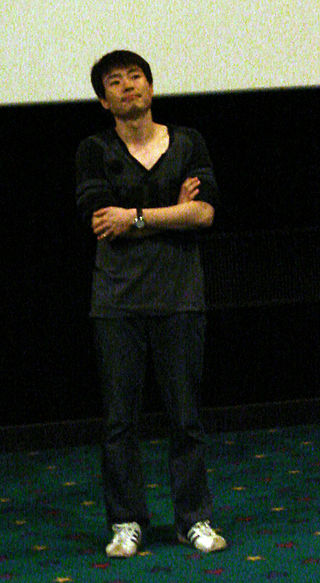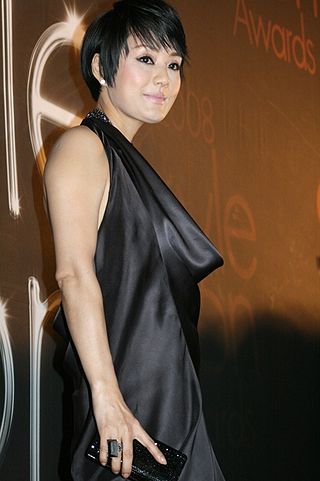Related Research Articles

Ryoo Seung-wan is a South Korean filmmaker. He made his debut in 1996 with the short film 'Dangerous Head', then worked as a director under director Park Chan-wook, took film lessons, and made his feature film debut in 2000 with Die Bad. In 2000, he received the Blue Dragon Film Awards for Best New Director, drawing attention from the film industry. Ryoo Seung-wan is called Korea's 'action kid' for his unique action and rough life style, and he directed films such as Crying Fist and The Battleship Island.

Woman on the Beach is the seventh feature film by South Korean director Hong Sang-soo, and was released in 2006.

Diary of Korean-Japanese War is a 1978 South Korean war drama film directed by Jang Il-ho. It was chosen as Best Film at the Grand Bell Awards.
Um Aing-ran is a South Korean actress. She has starred in about 190 films, and gained a popularity with the image of "a cheerful female college student" in the 1960s. Her marriage with Shin Seong-il, a colleague actor and big star of the time, attracted national attention. Since then she had been retired from the film industry, but returned as a TV show guest and host in the 1990s. The couple have three children.

Ingyeo ingan, sometimes translated The Extra Mortals, is a 1964 South Korean film directed by Yu Hyun-mok. At the 2nd Blue Dragon Film Awards ceremony, the film won six awards, among them Best Film, Best Director, and Best Actor for lead Kim Jin-kyu. The film was based on a novel.

Chang Mi-hee is a South Korean actress. She was born Lee Yun-hui in Seoul, South Korea. Chang debuted as an actress in 1976 as starring in Seong Chun-hyang jeon directed by Park Tae-won and TBC TV drama, Haenyeo Dang-sil. Chang was commonly referred to as "New Troika" or "Second Troika" along with her rival actresses, Jeong Yun-hui and Yu Ji-in of the 1970s and 1980s after the "First Troika", Moon Hee, Nam Jeong-im, and Yoon Jeong-hee of the 1960s.
Jeong Yun-hui is a former South Korean actress active since 1975. She was born in Tongyeong, a southwestern coastal city of South Gyeongsang province, South Korea in 1954. After graduation from Hyehwa Girls' High School, Jeong debuted as an actress in 1975 as starring in Yokmang directed by Lee Gyeong-tae. Jeong was commonly referred to as one of the "New Troika" or "Second Troika" along with her rival actresses, Chang Mi-hee and Yu Ji-in of the 1970s and 1980s after the "First Troika", Moon Hee, Nam Jeong-im, and Yoon Jeong-hee of the 1960s.

Yoon Jeong-hee was a South Korean actress and beauty pageant titleholder who competed at Miss Korea 1964. She debuted in 1967 in Theatre of Youth. She appeared in about 330 films, and her better known works are New Place (1979), Woman in Crisis (1987) and Manmubang (1994). Her last performance was in 2010, in director Lee Chang-dong's film Poetry, for which she won 7 best actress awards including Asia Pacific Screen Award for Best Actress at 4th Asia Pacific Screen Awards, the Grand Bell Award at 47th Grand Bell Awards, and Los Angeles Film Critics Association Award at 2011 Los Angeles Film Critics Association Awards.
Moon Hee is a South Korean actress born in Pusan, July 16, 1947 and has been active since 1965. While attending Seorabeol Art College with a film and theater major, she applied for recruiting new actors by KBS TV. When she was attending for a camera test, Moon was picked up by an assistant director of Lee Man-hee. She was cast to star in Lee's film Heukmaek. She was commonly referred to as one of the "Troika" along with her rival actresses, Yoon Jeong-hee and Nam Jeong-im of the 1960s and early 1970s. Moon Hee retired from the acting career when she married Jang Gang-jae, the vice president of Hankook Ilbo in November 1971 who later became the chair of the newspaper company.

Chae Shi-ra is a South Korean actress born in Seoul. Chae acted in Eyes of Dawn in the 1990s. She has since been referred to as a representative actress of that decade, along with Kim Hee-ae and Ha Hee-ra.

Kim Ja-ok was a South Korean actress. Kim was born in Busan in 1951. Kim dropped out of Hanyang University majoring in Film. Kim started her acting career after admitted to a public recruit by MBC TV. During the early period of the 1970s, she mainly starred in TV series, while in the late 1970s, Kim focused on film. Kim gained a popularity for her cheerful depiction on a woman of the new generation such as Sinbu ilgi (신부일기). Her last husband was singer, Oh Seung Geun. Her brother was announcer, Kim Tae Ok.
Jeon Ok was a Korean actress and singer. Jeon was referred to as "Queen of Tears" for her excellence at acting for tragic dramas.
Kang Hyo-shil was a South Korean film and stage actress.
Na Young-hee, born Bang Suk-hui, is a South Korean actress. Na was born in Boeun, North Chungcheong Province, South Korea.

Midnight FM is a 2010 South Korean action thriller film by Kim Sang-man starring Soo Ae and Yoo Ji-tae.

My Rosy Life is a 2005 South Korean television drama series starring Choi Jin-sil, Son Hyun-joo, and Lee Tae-ran. It aired on KBS2 from August 24 to November 10, 2005 on Wednesdays and Thursdays at 21:55 for 24 episodes.
Kwak Sin-ae is a South Korean film producer who is the CEO of the Seoul-based Barunson Entertainment & Arts Corporation, best known as a producer of the 2019 film Parasite. She and Bong Joon-ho won the Academy Award for Best Picture at the 92nd Academy Awards for Parasite, which also received the award for Best Feature Film at the Asia Pacific Screen Awards, and was nominated for Best Film at the 73rd British Academy Film Awards.

Kim Min-jung, known professionally as Gong Min-jeung (공민정), is a South Korean actress. She is an actress active in independent film, known for her roles in three Hong Sang-soo films, Yourself and Yours, On the Beach at Night Alone, and Grass. In 2020, she won the Fantastic Best Actor Special Mention Award in the 24th Bucheon International Fantastic Film Festival for Zombie Crush: Heyri.

Kang Mal-geum is a South Korean actress. She graduated in Arts from Pusan National University, Department of Korean Language and Literature. She made her acting debut in 2010 in the film Yong-Tae :The Ordinary Memories. She is known for her role in the film Lucky Chan-sil (2019), for which she earned six 'Best New Actress' and one 'Best Actress' awards in seven different award shows. She also appeared in the film The Chase (2017) and the television series Legal High (2019) and Missing: The Other Side (2020). In 2021, she appeared in a small role on the hit Netflix survival drama series Squid Game.
Lee Chung-hyun is a South Korean film director. From his high school days, he has been actively involved in creating short films. In 2015, he gained recognition for his short film titled Bargain, which received positive reviews at various film festivals. Lee made his debut as a feature film director in 2020 with the Netflix thriller film The Call.
References
- 1 2 태현실 [Tae Hyun-sil] (in Korean). Korean Movie Database (KMDb). Retrieved 2010-02-09.
- ↑ "Cast and Crew DB >Tae Hyun-sil >Filmograpies". Korean Movie Database (KMDb). Retrieved 2010-02-10.